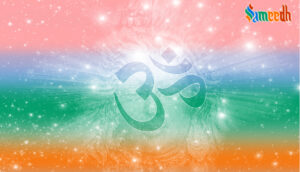In Hinduism, Brahman is the ultimate, unchanging reality or supreme cosmic spirit. It is considered the source and essence of the material world, and it transcends all personal and impersonal aspects of the divine. Brahman is often described as formless, infinite, and beyond human comprehension.

Brahman is the ultimate reality that underlies and unifies the diversity of the world. It is beyond the limitations of time, space, and causation. Brahman is both impersonal and personal. In its impersonal aspect, it is referred to as Nirguna Brahman, which is without attributes. In its personal aspect, it is referred to as Saguna Brahman, which is associated with qualities and attributes. Devotees often worship deities such as Vishnu, Shiv, or Devi, considering them as manifestations of the personal aspect of Brahman.
In Vedanta, a major school of Hindu philosophy, there is a concept called “Atman,” which refers to the individual soul or self. Advaita Vedanta, a non-dualistic school, teaches that Atman is identical to Brahman. The realization of this identity, known as “Brahman realization” or “Self-realization,” is considered the ultimate goal of human life.
The concept of Brahman is deeply rooted in Hindu scriptures, and various texts explore and elucidate this ultimate reality in different ways. Here are some of the key scriptures in Hinduism that discuss Brahman:
- Vedas:
- The Vedas are the oldest and most authoritative scriptures in Hinduism. The Rigved, Samaved, Yajurved, and Atharvaved contain hymns and philosophical discussions that hint at the nature of Brahman.
- The Upanishads, which are considered the culmination of Vedic thought, specifically delve into the nature of Brahman. Mandukya Upanishad, Chandogya Upanishad, and Brihadaranyaka Upanishad are particularly significant in this context.
- Bhagavad Gita:
- A part of the Indian epic Mahabharat, the Bhagavad Gita is a conversation between Prince Arjun and Lord Krushna, who is considered an avatar of Vishnu. In the Gita, Krushna expounds on the nature of reality, the self (Atman), and the concept of the ultimate reality, which can be identified with Brahman.
- Brahma Sutras:
- Also known as Vedanta Sutras, these aphorisms were composed by the sage Vyasa. They systematically organize and summarize the philosophical teachings found in the Upanishads, emphasizing the non-dualistic nature of Brahman and Atman.
- Puranas:
- The Puranas are a genre of ancient Indian literature that includes mythological stories, legends, and cosmology. While they are primarily known for narratives about deities and creation, some Puranas discuss the nature of Brahman and its relationship with the cosmos. Examples include the Vishnu Purana and Shiva Purana.
- Advaita Vedanta Texts:
- Advaita Vedanta, a non-dualistic school of Hindu philosophy, has produced several important texts that elaborate on the identity of Brahman and Atman. Works by Adi Shankaracharya, such as “Vivekachudamani” and “Atma Bodha,” are key texts in this tradition.
- Bhakti Texts:
- Bhakti traditions focus on the devotional aspect of Hinduism. Texts like the Bhagavata Purana, Ramayan, and various bhakti poets’ compositions highlight the worship and love for personal deities as manifestations of Brahman.
These scriptures, among others, collectively contribute to the understanding of Brahman from various philosophical and devotional perspectives within Hinduism. Different schools of thought may emphasize different aspects of Brahman based on their interpretations of these texts.
The concept of Maya is integral to understanding Brahman. Maya is the cosmic illusion that veils the true nature of reality, causing individuals to perceive the world as separate from Brahman. Overcoming Maya through spiritual knowledge and realization is a central theme in Hindu philosophy.
Brahman is also associated with the cosmic order or Rita, which governs the functioning of the universe. The proper understanding and alignment with Rita are considered essential for leading a righteous and harmonious life.
It’s important to note that the understanding of Brahman may vary among different Hindu traditions and philosophical schools. Some traditions may emphasize the personal aspect of Brahman through devotion and worship, while others may focus on the non-dualistic nature of Brahman and Atman.